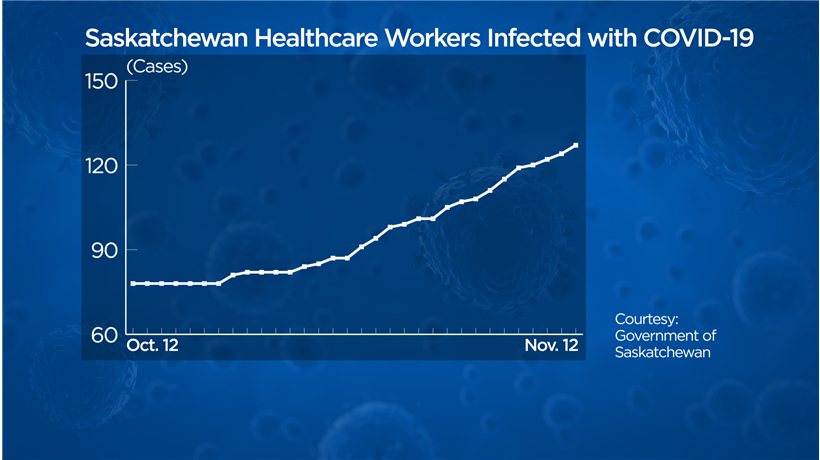The resources of Saskatchewan’s health care system are maxed out, says the president of the provincial nurses union, who has been fielding calls from exhausted members.

“The hospitals are overcapacity and when they’re overcapacity, all of that lands at the feet of physicians and the nurses and the rest of the health care team to manage,” Saskatchewan Union of Nurses president Tracy Zambory told Global News.
“And when that happens day after day after day, it takes a toll.”
Saskatchewan’s cumulative coronavirus case count reached 4,437 on Thursday, with 1,459 considered active. Forty-nine people are hospitalized and 13 of them are in intensive care.
Zambory said nurses are reporting overcrowding and understaffing to their union.
The Royal University Hospital’s former pediatric ICU has been turned into a makeshift adult ICU, without proper infection control measures, she says she’s being told.
“We are at the limit,” Zambory said. “”We’re looking at a human health resource issue.
“They’re feeling tired. They’re feeling scared. The rules are changing around them constantly.”
Zambory, in her role, speaks on behalf of Saskatchewan’s registered nurses. She has added her voice to a chorus of doctors calling intervention.

Get weekly health news
Hundreds have signed an open letter to the premier, health minister and chief medical health officer, stating, “we are losing the battle against the virus.”
On Thursday, as Manitoba and Alberta brought back restrictions, Saskatchewan officials said they, too, were considering enhancing public health measures, with details to come Friday.
The Saskatchewan Medical Association’s CEO, who, according to the organization, does not do media interviews on its behalf, took to social media with an additional concern: the increasing rate at which health care workers appear to be getting infected.
According to the province’s daily data, between the beginning of the pandemic and Oct. 12, 78 health care workers had contracted it (although not all cases are necessarily workplace-related). Over the past month alone, 49 more have gotten sick and the cumulative count is now sitting at 127.
Zambory said not many of the infections are in registered nurses, who, so far, are being provided with adequate personal protective equipment.
But with the virus spreading in long-term care settings, “our very important support workers, special care aids, we know that there’s a good potential that they have been affected,” Zambory said.
In the spring, during the early days of the coronavirus in Saskatchewan, the province announced it had been working with licensing bodies to expand the arsenal of available health care workers.
At one point in August, the Saskatchewan Registered Nurses Association had 103 emergency licences issued. Now, there are 39, the organization said in an email.
Global News also reached out to the Saskatchewan Association of Licensed Practical Nurses, which, in the spring, had reported issuing about 30 emergency licences of its own.
President Lynsay Nair said in an update they’ve all since expired.
Noting there could be demand this winter if coronavirus cases keep climbing, she said neither the health authority nor private employers have not yet reached out seeking more resources.






Comments